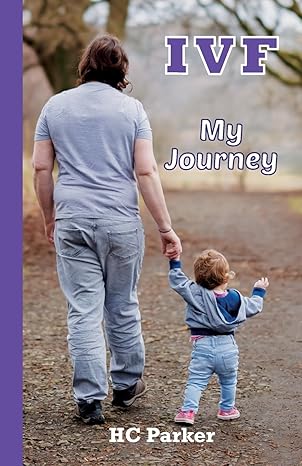IVF or in vitro fertilization can be an interesting time in your life full of questions, potential changes and the general up and down of it all too. There are hospital appointments, medications, hormones and new people to get to know in the shape of the medical team looking after you. Then there are questions like, how you are going to fit it all into your current lifestyle and work schedule, people constantly asking how you are, and all of this on the quest to becoming a parent and ultimately a family.
If you are about to embark on this journey, or have already started, then here are some tried and tested practical tips from H.C Parker, author of IVF: My Journey, to help make navigating this chapter easier.

Listen to your body
The first and most important one is to listen to your body, easier said than done I admit but it really will be the first one to tell you what it needs. Whether that is sleep, a day on the couch watching telly post egg retrieval, a hug from someone, a good cry, a quiet space for reading a good novel or a listening ear as you tell someone your hormones are on their own little rollercoaster ride and you are not enjoying the trip. So prioritise tuning in to your body and give it what it needs, guilt free.
Watch what you eat
Good nutrition is vital during IVF treatment. You need to nourish your body with all the right vitamins and minerals so increase your fruit and veg intake when you can. You also need to think about healthier and slow releasing carbs like oats and seeded breads to help with energy levels and lean proteins like chicken and fish to help the body work to its optimum performance.
A top tip for surviving IVF is to batch cook in advance so all you need to do at the start of a busy day is pull a dinner out of the freezer so it is ready for cooking at the end of the day. This will be especially beneficial on the days when you feel exhausted, hormonal or like you’ve been out all day at appointments and don’t have the time or the inclination to cook a healthy meal from scratch.
That being said you also need an emergency chocolate bar or two stashed in the cupboard as a small reward after all those hospital appointments.
Keep moving
Fitness is also a key ingredient for a successful IVF journey because it can alleviate the feelings of stress, anxiety, tension and other emotions, ultimately turning the bad vibes into good vibes and feelings. Fitness doesn’t necessarily mean going to a high intensity class at the gym or lifting a heavy weight. It could be as simple as a twenty-minute walk around the block, dancing in the kitchen to your favourite songs or following along with an online exercise class, just try and get your body moving in a way that feels good for you.
Set clear boundaries
Whilst you go through IVF you will probably find you have lots of well meaning friends and family that want to check in on you which is lovely and it’s very good for you to open up and talk to those you trust about how you’re coping. However, it’s also very important to set yourself some boundaries and to have the confidence to stick to them, explain to people that you don’t want to talk right now or that you don’t want to go into too much detail.
If at any point on your journey you have an option to talk to a counsellor then this may work for you as well along with online support groups, sometimes it’s easier to talk to people you don’t know or with people who have experienced what you’re experiencing.
Keep a Diary
Another top tip for surviving IVF is to keep a diary. This can be used as a personal space where you can write down how you are feeling, what your body is going through, how things are affecting you and your lifestyle, with lack of fear of judgement, uninvited opinions or further questions. Writing things down enables your brain to process thoughts better and helps to reduce over thinking, spiralling and feelings of overwhelm. Having everything written down also acts as a great way to record your coping mechanisms as you can revisit what you’ve written and remember what worked and what didn’t work at various points in your journey, not to mention it creates a nice keepsake for after the baby is born when you can reread them and congratulate yourself on surviving IVF!
